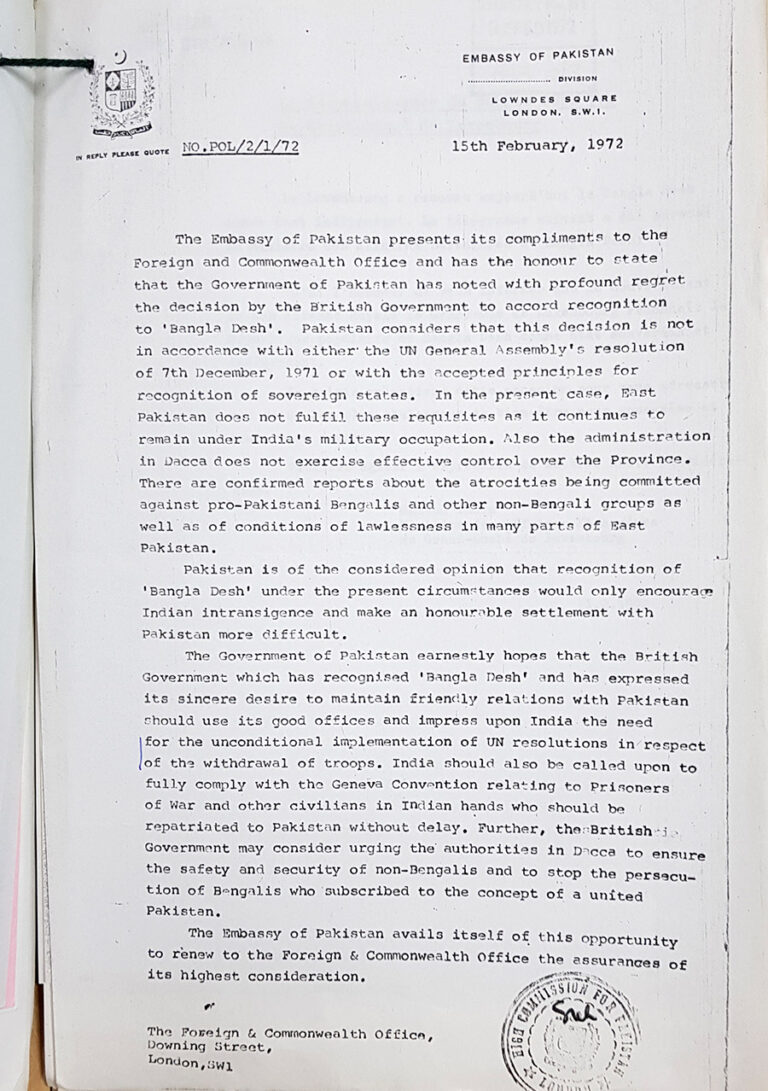Bangladesh will be marking its 50th anniversary on Independence Day on 26 March 2021.
Before returning home to take up his new role, Mujibur Rehman, the first leader of Bangladesh, visited Britain after being detained in Pakistan. It is recorded in one of our files from January 1972 that he said to the British Prime Minister, Edward Heath, that there was no question of a formal link between Bangladesh and West Pakistan. But the file also said that he did not show rancour and asked for good relations between the two, and then went on to say that ‘the partition should be in his words “a parting as of brothers”.’
Mujib seemed to have borne up well to the rigours of imprisonment but he was still very tired and disoriented. During his meeting with the Prime Minister he said that he considers that there can now be no question of a formal link between Bangla Desh and West Pakistan; he has apparently said the same thing to Bhutto prior to his release. However, although he spoke with bitterness of the actions of the Pakistani Army, he showed no rancour towards Bhutto and said he wished to establish good relations with Pakistan. Relations with India would, of course, be much closer. The partition should be, in his words, ‘a parting as of brothers’.
Catalogue ref: FCO 37/1019
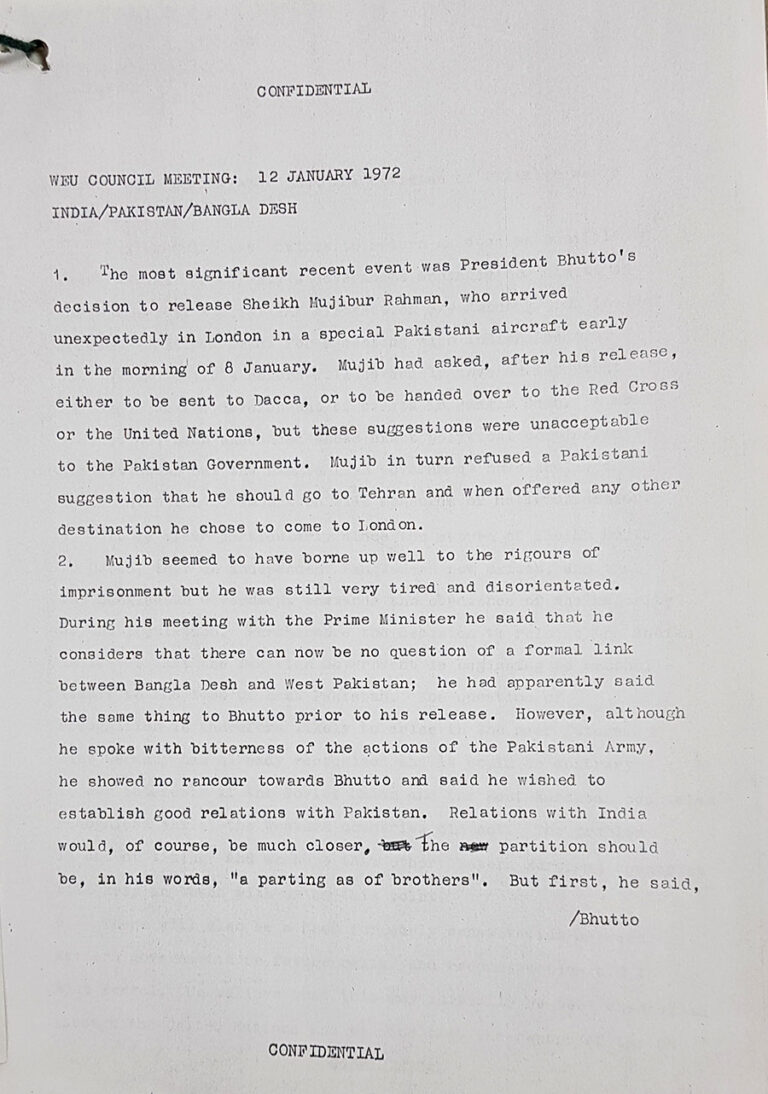
The situation had been very serious, as one of the telegrams in the files noted when it reported that Mujib (as he was also referred to in the files) was astonished at what had happened to him after expecting to be made the next Prime Minster of Pakistan, with his arrest, the attack of the Pakistani army, and the ordering of his execution.
Referring to the events of last March leading up to his arrest, Mujib said he had been astonished at what had happened as President Yahya Khan had on 24 March agreed to the four requests which he had put forward and he had understood only technical difficulties remained to be settled. He had been waiting for a telephone call from President Yahya when he had been informed that the Pakistani Army was into the attack. As regards the circumstances of his release, Mujib stated that on the eve of the surrender of the Pakistan forces in the east President Yahya had ordered his execution. The officer in charge of the jail at Mianwali had however succeeded in taking him to his own house and he had subsequently been transferred to another jail in NWFP. After Bhutto’s advent to power Yahya Khan had urged that Mujib should be executed and had offered to take responsibility by signing an ante-dated order for his death.
Catalogue ref: FCO 37/1019
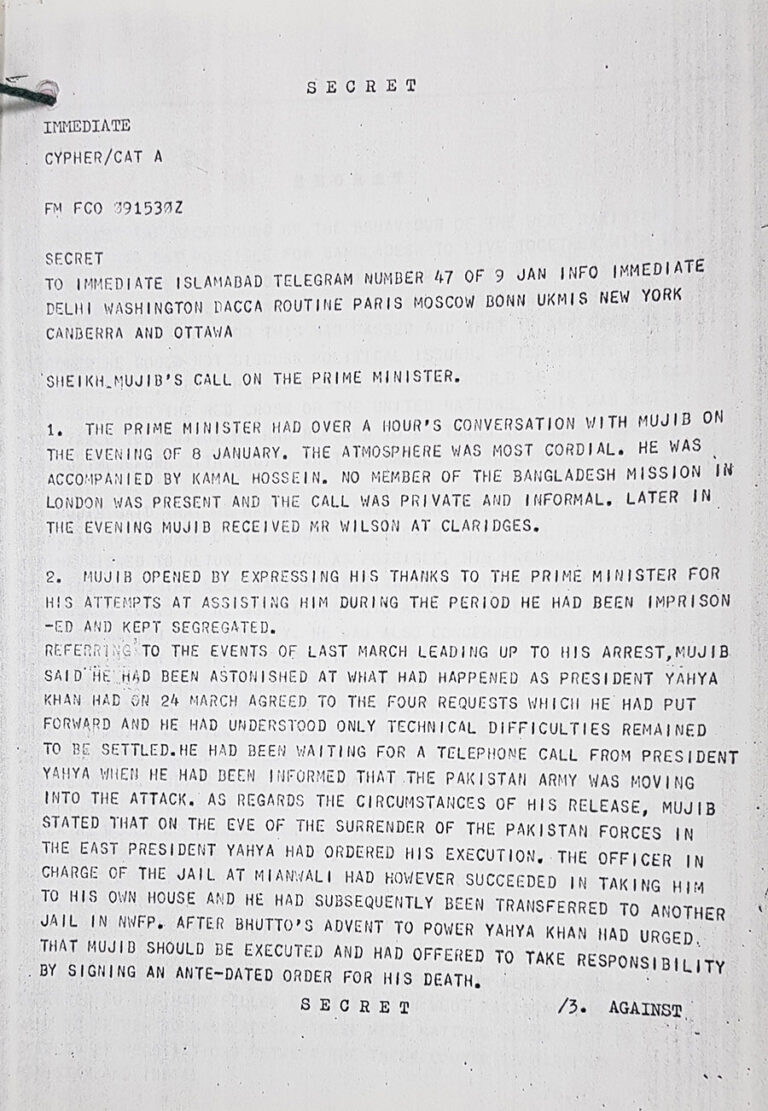
The division that led to the birth of Bangladesh could be seen as part of what the historian Vazira Fazila-Yacoobali Zamindar has referred to as the ‘long partition’ – the unfinished business from 1947, when a new nation of Pakistan was born with two parts separated by over 2,000 km of foreign territory.
Speedily created, the new nation of Pakistan sought to join together disparate groups, perhaps most challengingly those from east and west Pakistan. There was no way of ironing this out in the short time after the birth of Pakistan, and the tensions that arose between the eastern and the western wings of the new country mounted.
While in London, Mujibur Rahman was keen to impress upon his hosts that he wanted to return to Bangladesh as soon as possible, and that his focus on returning would be to pursue a policy of nationalisation (FCO 37/1019). Mujib’s stated aim was to make Bangladesh the Switzerland of the East by cutting unproductive spending with only a small army and police force (FCO 37/1019).
At the same time the British Prime Minister asked about Bangladesh accepting liability for a proportion of debts now that Bangladesh would be independent of Pakistan. Mujib indicated that he was ready to consider a representative amount and ready for an arbitrator, such as Britain or Iran, to help negotiate a final agreement. However, Mujib indicated that he would not be prepared for Pakistan to be unreasonable, as he had more legal and moral authority to represent Pakistan as a whole as he had won an absolute majority in the Pakistan assembly, and only Sind and Panjab had not supported him.
The Prime Minister asked about Bangladesh accepting liability for a proportion of the overall obligations of Pakistan. Mujib said he was prepared to be reasonable on this. He would accept liability for debts representing expenditure in Bangladesh. Bhutto would have to accept responsibility for debts representing expenditure in West Pakistan. He would be prepared to join with West Pakistan in asking Britain to appoint an arbitrator to settle this division and would accept his award. Alternatively he would be prepared to accept other means of negotiation and finalising these matters. There might for instance be one arbitration from Iran and one from Britain. However, if West Pakistan was not prepared to be reasonable he too could be awkward and would repudiate liability for any of the overall Pakistan debt. He had more legal and moral right than Bhutto to represent Pakistan as a whole as his supporters had an absolute majority in the elected national assembly and among the provinces. After all only Sind and the Punjab had not supported him.
Catalogue ref: FCO 37/1019
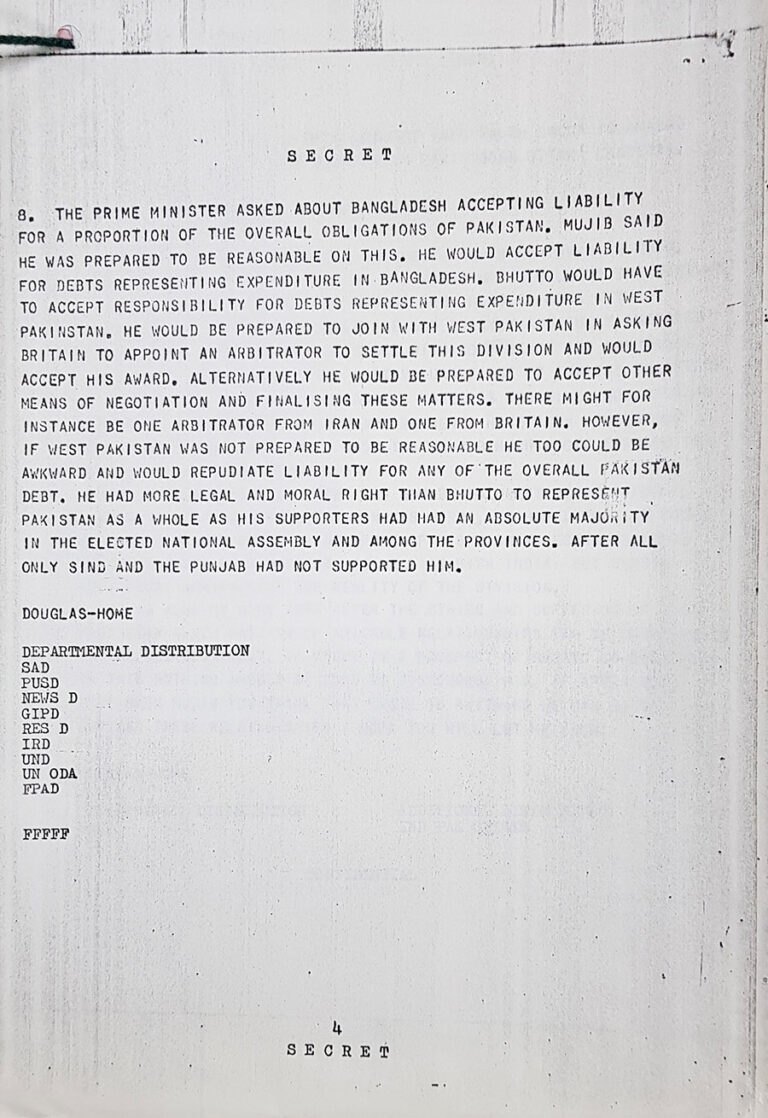
The question of recognising the new state of Bangladesh was tied up with British business interests and a co-ordinated international effort. A key concern for the British Cabinet was that interests in the jute industry were safeguarded: any delay could be costly. The Prime Minister, in summing up a discussion in Cabinet, could see a road map to early recognition but also saw the importance in getting the US view on matters.
The Prime Minister, summing up the discussion, said that it was agreed that there were strong arguments for the early recognition of Banga Desh and that the Foreign and Commonwealth Secretary was authorised to arrange for this when he judged that the appropriate time had come; some of our European allies and older Commonwealth countries might be glad to recognise at about the same time as ourselves. Although it was right that the views of United States Government should be sought we were under no obligation to them in the matter.
Catalogue ref: FCO 37/1019 (145947)
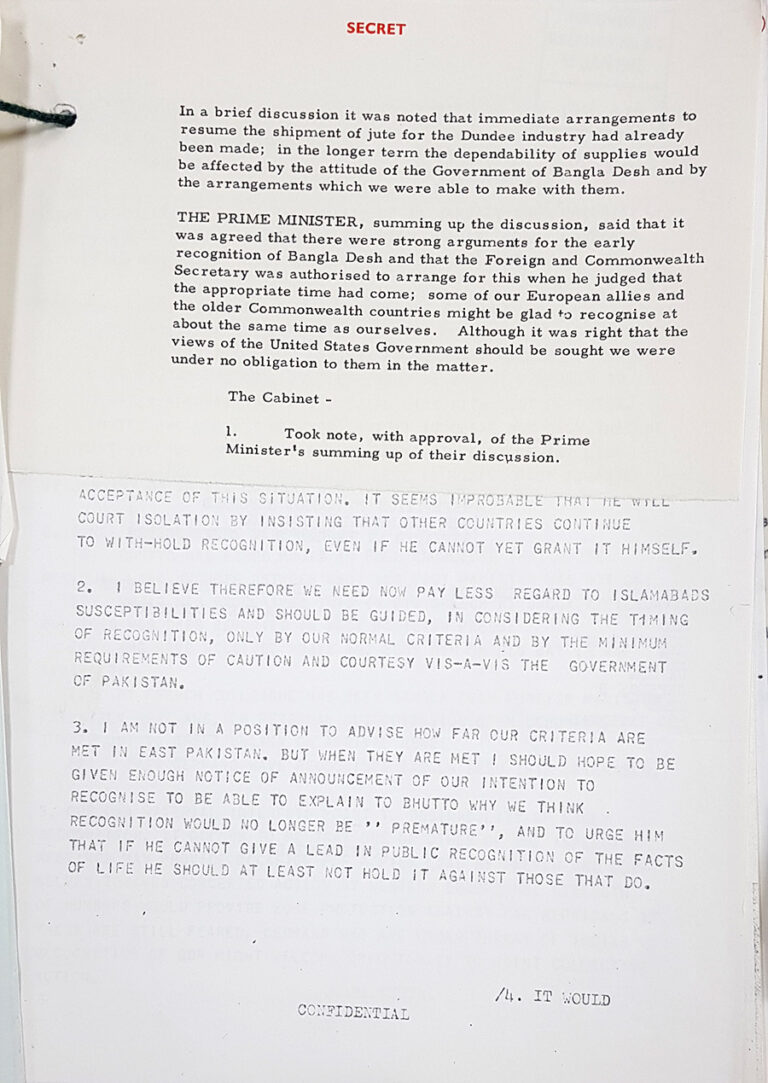
Part of the issue for the West, reflected in the files, was that delays in recognising Bangladesh would give Eastern Europe the upper hand and that particularly Britain’s financial interests would be compromised, for example by Bangladesh turning to use India’s banking facilities (FCO 37/1019). In an effort to maintain good relations, Britain and the West were keen to ensure that aid was given to assist the new nation (FCO 37/1019).
There remained some delay in recognising Bangladesh for fear that it would be seen as an unfriendly act by Pakistan. The British government could take some comfort that Pakistan did appear to be reconciling itself to the situation (FCO 37/1019) and that Britain’s role was now to get Bhutto to accept the situation (FCO 37/1019), and that Britain’s recent treatment of Mujib in London and the provision of an aircraft had, according to the note, ‘won us considerable good will in Dacca’ (FCO 37/1019).
There was also a realisation that concerted western recognition of Bangladesh would be harder for Bhutto to reject (FCO 37/1020). Files record the countries that were gradually recognising Bangladesh (FCO 37/1023). For the British Prime Minister, the ideal situation was that Pakistan would accept Bangladesh and that the acceptance of Bangladesh into the Commonwealth would not lead to Pakistan’s withdrawal (FCO 37/1019).
There was certainly resistance from the Pakistani side to the recognition of Bangladesh, such as the letter from the Pakistani embassy in Britain dated 15 February 1972 (see below), but the aim remained to reconcile Pakistan to the change that had taken place.
The Embassy of Pakistan presents its compliments to the Foreign and Commonwealth Office and has the honour to state that the Government of Pakistan has noted with profound regret the decision by the British Government to accord recognition to ‘Bangla Desh’. Pakistan considers that this decision is not in accordance with either the UN General Assembly’s resolution of 7th December, 1971 or with the accepted principles for recognition of sovereign states. In the present case, East Pakistan does not fulfil these requisites as it continues to remain under India’s military occupation. Also the administration in Dacca does not exercise effective control over the Province. There are confirmed reports about the atrocities being committed against pro-Pakistani Bengalis and other non-Bengali groups as well as of conditions of lawlessness in many parts of East Pakistan.
Catalogue ref: FCO 37/1025
